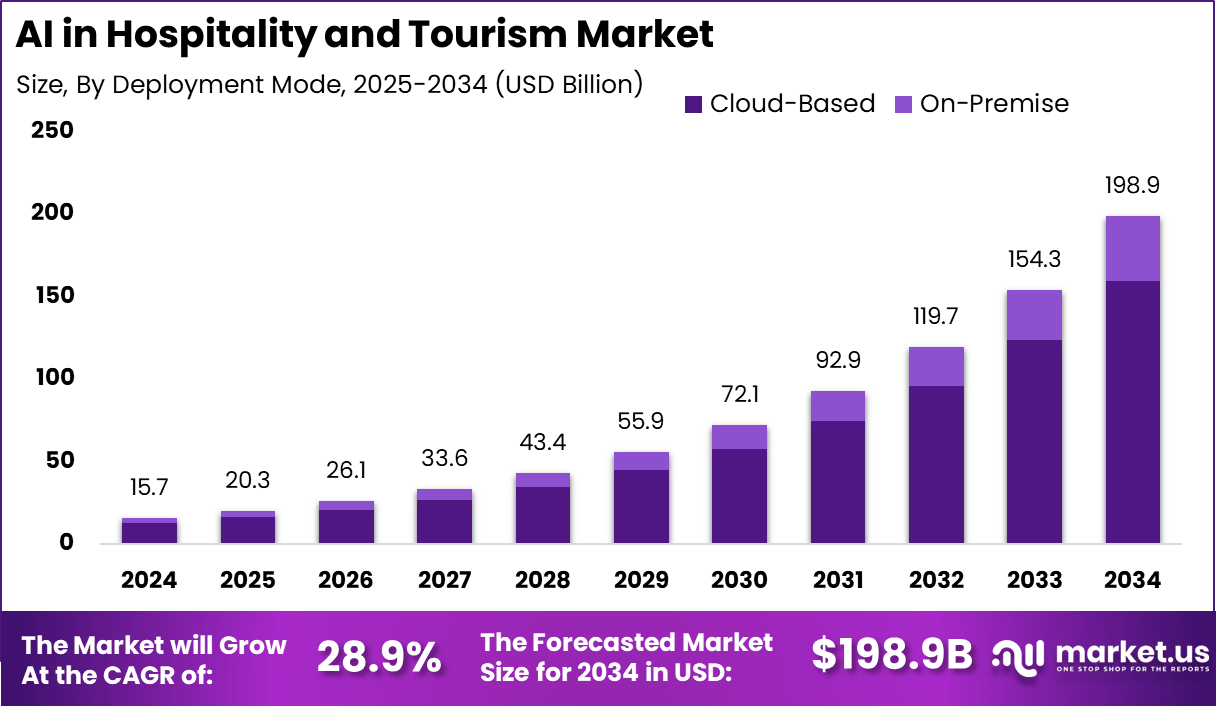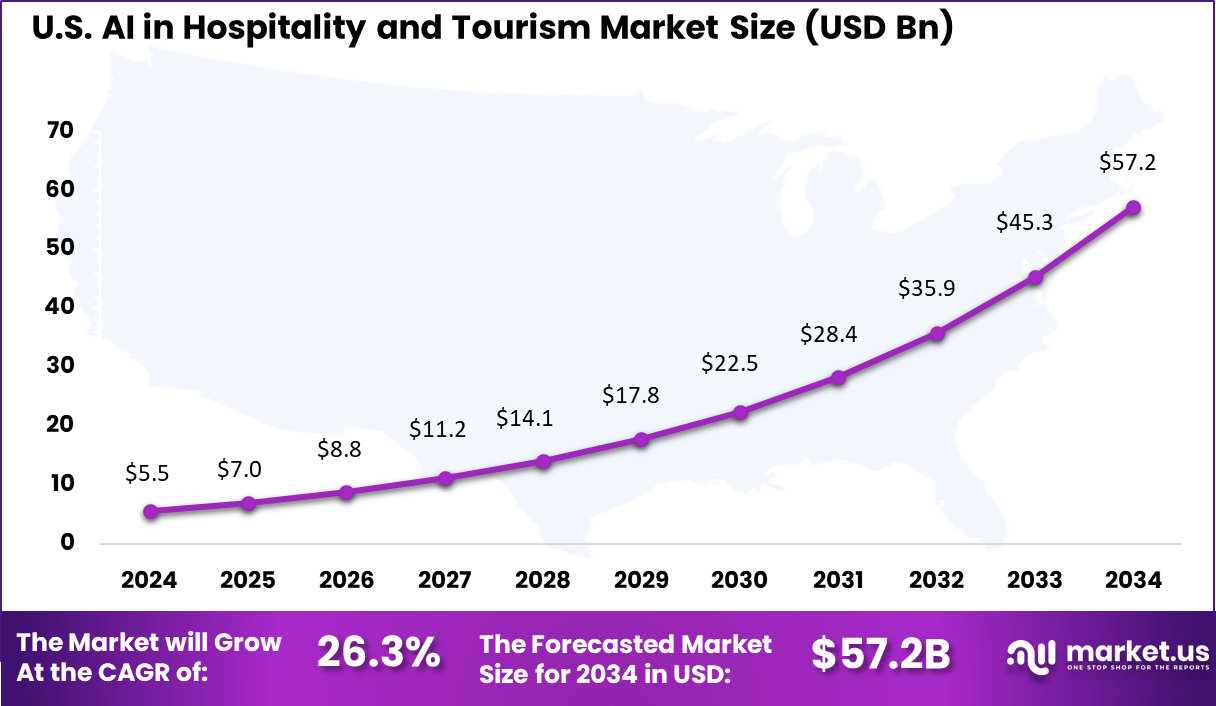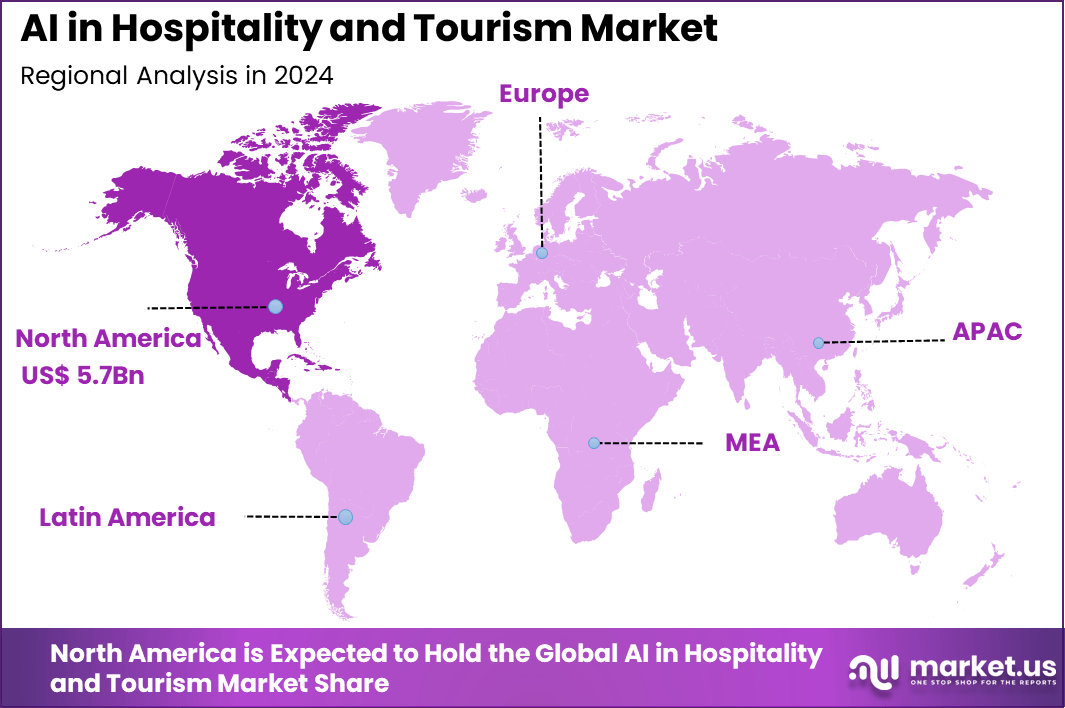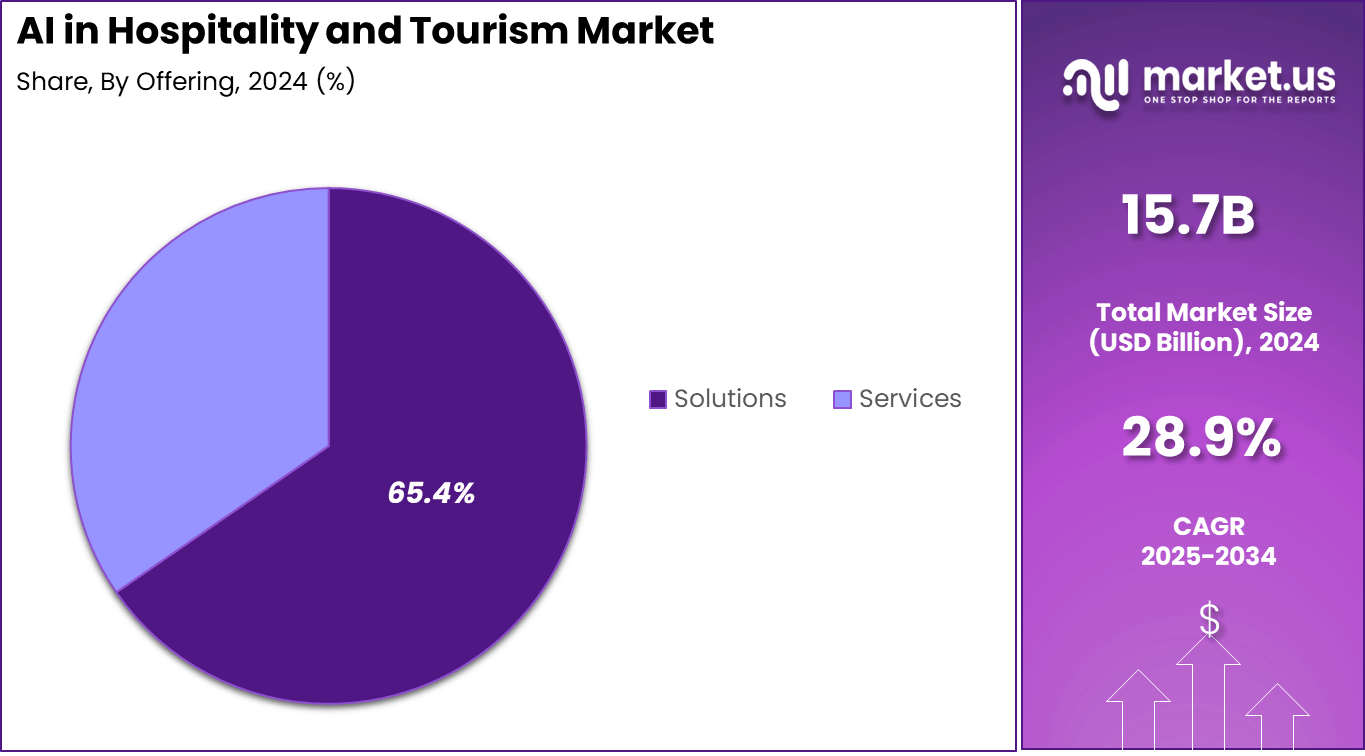Global AI in Hospitality and Tourism Market Size, Share, Industry Analysis Report By Offering (Solutions (Customer Relationship Management (CRM), Revenue Management Systems (RMS), Chatbots & Virtual Assistants, Others), Services (Integration & Deployment Services, Support & Maintenance Services, Consulting & Strategy Services), By Deployment Mode (Cloud-based, On-premises), By Application (Guest Experience & Personalization, Operations & Workflow Automation, Revenue & Sales Management, Marketing & Customer Support, Other Applications), By Technology (Machine Learning (ML) & Deep Learning, Natural Language Processing (NLP), Computer Vision, Generative AI, Others), By End-User (Hotels & Resorts, Cruise Lines, Tour Operators & Travel Agencies, Online Travel Agencies, Others), By Region and Companies - Industry Segment Outlook, Market Assessment, Competition Scenario, Trends and Forecast 2025-2034
- Published date: Sept. 2025
- Report ID: 157063
- Number of Pages: 297
- Format:
-
keyboard_arrow_up
Quick Navigation
- Report Overview
- Key Insight Summary
- Analysts’ Viewpoint
- US Market Size
- Emerging Trends
- Top Use Cases
- By Offering Analysis
- By Deployment Mode Analysis
- By Application Analysis
- By Technology Analysis
- By End-User Analysis
- Key Market Segments
- By Offering
- Driver Analysis
- Restraint Analysis
- Opportunity Analysis
- Challenge Analysis
- Competitive Analysis
- Recent Developments
- Report Scope
Report Overview
The Global AI in Hospitality and Tourism Market size is expected to be worth around USD 198.9 Billion By 2034, from USD 15.7 billion in 2024, growing at a CAGR of 28.9% during the forecast period from 2025 to 2034. In 2024, North America held a dominan market position, capturing more than a 36.8% share, holding USD 5.7 Billion revenue.
AI in the hospitality and tourism market refers to the use of artificial intelligence technologies to improve customer experiences, increase operational efficiency, and personalize services across hotels, travel, leisure, and related sectors. AI applications range from smart chatbots handling guest inquiries, automated check-in systems, and dynamic pricing models, to advanced data analytics for understanding customer behaviors and optimizing resource usage.
One of the top driving factors for AI adoption in this market is the increasing demand for personalized guest experiences. Consumers today expect services that align with their preferences and past behaviors, and AI enables businesses to analyze vast amounts of data and deliver hyper-personalized offers and recommendations.

Operational efficiency is another critical factor, as AI automates repetitive tasks such as room service scheduling, housekeeping, and booking management, allowing staff to focus on more complex and meaningful guest interactions. Furthermore, AI’s ability to enhance revenue management with dynamic pricing and demand forecasting also drives its integration into hospitality and tourism.
According to WifiTalents, AI adoption in travel and hospitality is accelerating, with 60% of travel companies expected to implement AI-driven personalization by 2025. AI chatbots already manage over 75% of customer inquiries in the hospitality sector, while 45% of travelers prefer AI-powered tools for trip planning. Revenue management systems using AI are delivering measurable benefits, boosting hotel revenues by an average of 5-10%.
Insights from HotelTechReport further confirm this trend. About 76% of hotel executives state that AI is fundamentally transforming the industry, with 79% reporting positive business impact. Over 55% believe AI will revolutionize hotel operations, while half of all hotels had planned to integrate AI by 2024. Looking ahead, 60% of hotels and 70% of travel firms are expected to adopt AI tools, and 64% of hoteliers have already experimented with solutions like ChatGPT.
Key Insight Summary
- By offering, Solutions dominated the market with a 65.4% share.
- Cloud-based deployment led the industry, accounting for a strong 80.2% share.
- By application, Revenue & Sales Management was the top segment, holding 30.7% share.
- Natural Language Processing (NLP) was the leading technology, contributing 35.6% share.
- By end-user, Hotels & Resorts were the primary adopters, capturing 40.1% share.
Analysts’ Viewpoint
Investment opportunities in the AI hospitality and tourism market lie in developing AI-powered platforms for booking and customer relationship management, smart room technology, predictive analytics, and AI-led marketing solutions. There is a growing interest in AI integrations that enable seamless experiences across booking, check-in, stay, and post-visit phases.
Businesses benefit from AI by achieving higher guest retention through personalized loyalty programs, improved operational productivity by automating routine tasks, and increased revenue resulting from better demand forecasting and pricing optimization. AI enhances decision-making with actionable insights and enables businesses to allocate resources more effectively, resulting in smoother operations and an overall better customer journey.
The regulatory environment is becoming more defined, with frameworks such as the EU AI Act setting requirements for transparency, data privacy, and ethics in AI use. In the hospitality sector, this means companies must ensure data protection when analyzing customer information, avoid biases in AI algorithms, and comply with emerging standards to maintain guest trust.
US Market Size
The U.S. AI in Hospitality and Tourism Market was valued at USD 5.5 Billion in 2024 and is anticipated to reach approximately USD 57.2 Billion by 2034, expanding at a compound annual growth rate (CAGR) of 26.3% during the forecast period from 2025 to 2034.

In 2024, North America held a dominant market position in the AI in hospitality and tourism sector, capturing more than 36.8% share and generating around USD 5.7 billion in revenue. The region’s leadership is largely supported by its advanced digital infrastructure, high adoption of AI-driven solutions, and strong integration of data analytics in hotel and travel services.
The presence of well-established tourism networks and a large consumer base with high digital engagement has created fertile ground for AI applications ranging from personalized guest services to automated booking and smart concierge systems.

Emerging Trends
Key Points Description Hyper-Personalization Using AI to deliver highly tailored guest experiences based on data insights and behavior prediction. Contactless Technologies Mobile check-ins, digital keys, and voice assistants becoming standard for seamless, touch-free guest interactions. Predictive Maintenance AI predicts equipment failures to reduce downtime and improve service quality. Robotic Assistance Adoption of robots for housekeeping, food delivery, and guest services to enhance operational efficiency. Immersive Experiences VR/AR technologies employed for virtual tours and immersive destination previews. Top Use Cases
Key Points Description Smart Concierge Services AI-powered assistants provide personalized travel tips, recommendations, and facilitate bookings. Dynamic Pricing Models Real-time room rate adjustments based on supply, demand, and competitor analysis to optimize pricing. Automated Customer Support AI chatbots and virtual agents handle inquiries and bookings 24/7, improving guest satisfaction and reducing load. Language Translation Real-time translation services break down language barriers for international guests. Predictive Maintenance Sensor-based AI monitors assets and schedules maintenance proactively to avoid disruptions. By Offering Analysis
In 2024, the solutions segment holds a dominant 65.4% share of the AI in hospitality and tourism market in 2024. Solutions primarily include AI-powered software platforms, such as chatbots, virtual assistants, recommendation engines, and revenue management tools.
These solutions enable hotels, resorts, and travel companies to enhance operational efficiency, automate customer services, and deliver highly personalized guest experiences by analyzing vast datasets on customer preferences and behavior patterns.
The high adoption of AI solutions reflects the industry’s increasing focus on transforming guest experiences and optimizing backend processes. AI-driven solutions help reduce operational costs by automating routine tasks while increasing revenue through targeted marketing and dynamic pricing models, making them indispensable to hospitality and tourism businesses navigating a competitive landscape.

By Deployment Mode Analysis
In 2024, Cloud-based deployment leads with 80.2% market share in 2024, driven by the scalability, flexibility, and cost advantages cloud infrastructures provide. Cloud platforms enable real-time data processing and integration with diverse AI tools without significant upfront capital expenditure on hardware or maintenance.
This allows hospitality providers to quickly roll out AI solutions to enhance customer interaction points, such as mobile booking, virtual concierge, and personalized recommendations. Moreover, cloud deployment supports collaboration among geographically dispersed teams and seamless updates to AI applications, crucial in a sector where rapid innovation and adaptation to changing consumer trends are essential.
By Application Analysis
In 2024, Revenue and sales management is the most prominent application segment with 30.7% market share in 2024. AI technologies facilitate dynamic pricing, demand forecasting, and inventory optimization, allowing hospitality operators to maximize yields while responding swiftly to market changes or events.
AI-powered revenue management systems analyze multiple variables like seasonality, competitor pricing, and customer booking behaviors to optimize pricing strategies. This application enhances profitability by minimizing revenue leakage and improving utilization rates of rooms and services.
AI-driven insights also enable personalized sales and marketing campaigns, improving customer targeting and upselling opportunities, which boost overall revenue growth and competitive positioning.
By Technology Analysis
In 2024, Natural Language Processing technology commands a significant 35.6% share in the AI hospitality and tourism market in 2024. NLP supports conversational AI applications such as chatbots, voice assistants, and automated customer service platforms that interact naturally with guests.
These systems provide instant query resolution, booking support, and personalized travel recommendations, enhancing guest engagement and satisfaction. NLP-powered tools allow hospitality businesses to handle high volumes of customer interactions with speed and accuracy while freeing staff for higher-value tasks.
Additionally, NLP enables multilingual capabilities critical for global tourism markets, breaking language barriers and expanding accessibility to diverse traveler demographics.
By End-User Analysis
Hotels and resorts dominate the end-user segment with 40.1% market share in 2024. These establishments invest heavily in AI technologies to improve guest experience, streamline operations, and create memorable stays. AI-powered solutions play key roles in smart room automation, personalized recommendations, virtual concierge services, and customer behavior analytics.
The focus on hotels and resorts is driven by their need to differentiate in a crowded market by providing seamless, customized, and contactless customer interactions. Enhanced operational efficiency and marketing optimization through AI also contribute significantly to improved profitability and customer loyalty for these hospitality providers.
Key Market Segments
By Offering
- Solutions
- Customer Relationship Management (CRM)
- Revenue Management Systems (RMS)
- Chatbots & Virtual Assistants
- Others
- Services
- Integration & Deployment Services
- Support & Maintenance Services
- Consulting & Strategy Services
By Deployment Mode
- Cloud-based
- On-premises
By Application
- Guest Experience & Personalization
- Operations & Workflow Automation
- Revenue & Sales Management
- Marketing & Customer Support
- Other Applications
By Technology
- Machine Learning (ML) & Deep Learning
- Natural Language Processing (NLP)
- Computer Vision
- Generative AI
- Others
By End-User
- Hotels & Resorts
- Cruise Lines
- Tour Operators & Travel Agencies
- Online Travel Agencies
- Others
Regional Analysis and Coverage
- North America
- US
- Canada
- Europe
- Germany
- France
- The UK
- Spain
- Italy
- Russia
- Netherlands
- Rest of Europe
- Asia Pacific
- China
- Japan
- South Korea
- India
- Australia
- Singapore
- Thailand
- Vietnam
- Rest of Latin America
- Latin America
- Brazil
- Mexico
- Rest of Latin America
- Middle East & Africa
- South Africa
- Saudi Arabia
- UAE
- Rest of MEA
Driver Analysis
Personalization Enhances Customer Experience
AI in hospitality and tourism greatly drives growth by enhancing personalized customer experiences. AI analyzes vast amounts of data such as past bookings, preferences, and real-time interactions to tailor services specific to each guest. This personalization ranges from customized room settings to personalized dining and activity recommendations, helping guests feel valued and increasing loyalty.
Businesses use AI-powered chatbots and virtual assistants for real-time communication, enabling faster and more accurate responses to customer needs. Such personalization not only improves guest satisfaction but also helps hospitality companies attract repeat customers and differentiate themselves in a competitive market.
For instance, Marriott Bonvoy uses AI-powered search to personalize property recommendations, and cruise operators personalize onboard experiences with AI. These innovations boost customer engagement and revenue, making personalized AI a critical driver of market growth in this sector.
Restraint Analysis
High Implementation Cost and Privacy Concerns
One major restraint for AI adoption in hospitality and tourism is the high cost involved in deploying AI technologies. Implementing AI solutions requires significant initial investments in software, hardware, and training. Many hospitality businesses, especially smaller operators, may struggle to afford the upfront costs and ongoing maintenance expenses needed to benefit fully from AI capabilities.
Additionally, data privacy and security concerns pose challenges. AI systems rely on collecting and analyzing personal customer data, which raises worries about how this information is stored and used. Increasing regulations around data protection mean companies must invest more in securing AI platforms to maintain compliance and customer trust. These factors can slow AI adoption rates despite its benefits.
Opportunity Analysis
Operational Efficiency and Cost Reduction
AI presents a strong opportunity for the hospitality and tourism industry to boost operational efficiency and reduce costs. AI-driven tools can automate routine tasks such as staff scheduling, housekeeping management, and inventory control, freeing up human resources for higher-value activities.
For example, AI-powered predictive analytics help optimize staffing levels based on expected guest arrivals or events, minimizing labor costs while maintaining service quality. Hotels and restaurants can also leverage AI for dynamic pricing, adjusting room and service rates in real-time to maximize revenue based on demand and competitor prices.
AI applications in energy management and waste reduction further support sustainable operational practices, helping companies reduce expenses and environmental impact. This operational efficiency opportunity is appealing for all sizes of hospitality businesses aiming to improve their bottom line.
Challenge Analysis
Workforce Impact and Skills Gap
A significant challenge with AI adoption in hospitality and tourism is its impact on the workforce and the associated skills gap. Automation through AI tools can reduce the need for certain manual jobs like reception, housekeeping scheduling, and food service management.
This raises concerns about job displacement for employees who perform these tasks, potentially affecting employee morale and leading to resistance against AI integration. Moreover, the hospitality sector faces a shortage of skilled workers who understand AI technologies and can manage these systems effectively.
Training existing staff or hiring AI experts involves additional costs and time. Managing this transition while keeping service quality high is a delicate balance that many hospitality businesses must address to fully realize AI benefits.
Competitive Analysis
In the AI in Hospitality and Tourism Market, technology leaders such as Oracle Hospitality, Salesforce, Microsoft Corporation, Amazon Web Services, IBM Corporation, and Google LLC play a central role. Their platforms provide cloud infrastructure, customer engagement solutions, and data-driven analytics that enhance guest experiences and streamline hotel operations.
Another group of key players includes SAP SE, Intel Corporation, NVIDIA Corporation, Alibaba Group Holding Limited, and Huawei Technologies Co., Ltd. These firms focus on integrating advanced computing, machine learning, and AI acceleration technologies that support real-time booking systems and operational efficiency.
Service providers and travel platforms such as Accenture PLC, Cisco Systems, Travelport Worldwide Limited, Amadeus IT Group S.A., Expedia Group, Airbnb, Tripadvisor, Booking Holdings, and Agoda Company contribute by embedding AI in customer-facing platforms. They deploy tools for intelligent search, personalized recommendations, and dynamic pricing strategies. Their innovations support both large hotel groups and small service providers in competing globally.
Top Key Players in the Market
- Oracle Hospitality
- Salesforce
- Microsoft Corporation
- Amazon Web Services
- IBM Corporation
- Google LLC
- SAP SE
- Intel Corporation
- NVIDIA Corporation
- Alibaba Group Holding Limited
- Huawei Technologies Co., Ltd.
- Accenture PLC
- Cisco Systems, Inc.
- Travelport Worldwide Limited
- Amadeus IT Group S.A.
- Expedia Group, Inc.
- Airbnb, Inc.
- Tripadvisor, Inc.
- Booking Holdings Inc.
- Agoda Company Pte. Ltd.
- Others
Recent Developments
- In 2025, Salesforce unveiled its Summer ’25 product release featuring Agentforce, a digital labor AI solution enabling personalized AI agents across business functions including sales and customer service in hospitality.
- In June 2024, Sabre Hospitality, a US-based tech firm, launched SynXis Concierge.AI, its first generative AI solution designed to improve customer service. This tool leverages extensive data to provide quick, accurate, and detailed responses to guest inquiries, revolutionizing front-desk and support interactions.
Report Scope
Report Features Description Market Value (2024) USD 15.7 Bn Forecast Revenue (2034) USD 198.9 Bn CAGR(2025-2034) 28.9% Base Year for Estimation 2024 Historic Period 2020-2023 Forecast Period 2025-2034 Report Coverage Revenue forecast, AI impact on Market trends, Share Insights, Company ranking, competitive landscape, Recent Developments, Market Dynamics and Emerging Trends Segments Covered By Offering (Solutions (Customer Relationship Management (CRM), Revenue Management Systems (RMS), Chatbots & Virtual Assistants, Others), Services (Integration & Deployment Services, Support & Maintenance Services, Consulting & Strategy Services), By Deployment Mode (Cloud-based, On-premises), By Application (Guest Experience & Personalization, Operations & Workflow Automation, Revenue & Sales Management, Marketing & Customer Support, Other Applications), By Technology (Machine Learning (ML) & Deep Learning, Natural Language Processing (NLP), Computer Vision, Generative AI, Others), By End-User (Hotels & Resorts, Cruise Lines, Tour Operators & Travel Agencies, Online Travel Agencies, Others) Regional Analysis North America – US, Canada; Europe – Germany, France, The UK, Spain, Italy, Russia, Netherlands, Rest of Europe; Asia Pacific – China, Japan, South Korea, India, New Zealand, Singapore, Thailand, Vietnam, Rest of Latin America; Latin America – Brazil, Mexico, Rest of Latin America; Middle East & Africa – South Africa, Saudi Arabia, UAE, Rest of MEA Competitive Landscape Oracle Hospitality, Salesforce, Microsoft Corporation, Amazon Web Services, IBM Corporation, Google LLC, SAP SE, Intel Corporation, NVIDIA Corporation, Alibaba Group Holding Limited, Huawei Technologies Co., Ltd., Accenture PLC, Cisco Systems, Inc., Travelport Worldwide Limited, Amadeus IT Group S.A., Expedia Group, Inc., Airbnb, Inc., Tripadvisor, Inc., Booking Holdings Inc., Agoda Company Pte. Ltd., Others Customization Scope Customization for segments, region/country-level will be provided. Moreover, additional customization can be done based on the requirements. Purchase Options We have three license to opt for: Single User License, Multi-User License (Up to 5 Users), Corporate Use License (Unlimited User and Printable PDF)  AI in Hospitality and Tourism MarketPublished date: Sept. 2025add_shopping_cartBuy Now get_appDownload Sample
AI in Hospitality and Tourism MarketPublished date: Sept. 2025add_shopping_cartBuy Now get_appDownload Sample -
-
- Oracle Hospitality
- Salesforce
- Microsoft Corporation
- Amazon Web Services
- IBM Corporation
- Google LLC
- SAP SE
- Intel Corporation
- NVIDIA Corporation
- Alibaba Group Holding Limited
- Huawei Technologies Co., Ltd.
- Accenture PLC
- Cisco Systems, Inc.
- Travelport Worldwide Limited
- Amadeus IT Group S.A.
- Expedia Group, Inc.
- Airbnb, Inc.
- Tripadvisor, Inc.
- Booking Holdings Inc.
- Agoda Company Pte. Ltd.
- Others













